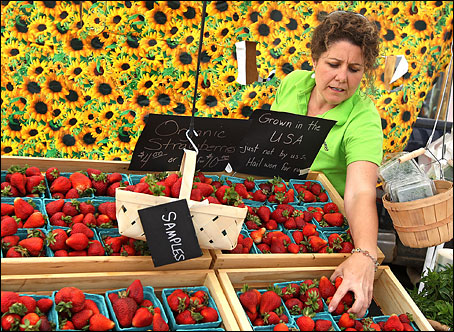
| |
A Vision of the FutureThe Economics of Local FoodBy Jane Black
All We Can Eat Blog (washingtonpost.com), September 8, 2009  (Ben Woloszyn
-- Associated Press)
You feel pretty virtuous when
you buy local food. It's fresher, maybe even more
nutritious, proponents say. Now advocates are
pushing another selling point: Local food
strengthens the economy. It keeps money in local
communities and helps create jobs, which in turn
can help reduce crime.
Wow. And you thought all you
were getting was a really good peach.
Sarah DeWeerdt rounds up the
facts about local food and economic development in
a new, excellent article in World Watch. The money
farmers earn goes in large part to buy seeds,
animal feed and fertilizers from outside the
region. In southeast Minnesota, farmers spend $996
million to grow $912 million worth of crops.
Similar patterns are found in Iowa, Arizona and
Washington.
Producing local food could
change that, DeWeerdt reports. If those people in
southeastern Minnesota bought just 15 percent of
their food from local sources, it would generate
two-thirds as much income as all the region's
farmers receive from subsidies. If the population
in and around Seattle bought 20 percent of their
food dollars at local businesses, it would inject
an extra billion dollars each year into the local
economy.
"Every time money changes
hands within a community, it boosts the
community's overall income and level of economic
activity, and fuels the creation of jobs,"
DeWeerdt explains. "The more times money changes
hands within the community before heading
elsewhere, the better off the community is. And
spending money at a locally based business has a
greater multiplier effect, the theory goes,
because locally owned businesses are more likely
to respend their dollars locally."
The article draws on
pioneering work by Ken Meter, president of the
Crossroads Research Center in Minneapolis, who has
studied the benefits of local food for more than
20 years. The argument, Meter told me, is catching
on. It's not only foodies who are interested in
local food. It's state and county economic
development officers. This is happening even in
the Midwest, where production agriculture has long
ruled supreme.
Of course, DeWeerdt rightly
notes that many of the potential benefits of
"shifting food dollars to the local food system
are just that: potential." To date, she reports,
no community has actually undertaken a sharp
enough shift to see if predictions come true. And,
it's hard to tell how a change to consumer
behavior would affect the larger economy.
Still, government officials
appear willing to explore how local food can help
bolster rural economies. Last week, Deputy
Secretary of Agriculture Kathleen Merrigan sent
out a memo that highlighted USDA funds available
to help build local food systems. The total amount
of money available: up to $1.24 billion.
Good for you. Good
for the economy. You have to admit, it makes that
local corn or peach or tomato taste just that
little bit more delicious
.
Food Is Power and the Powerful Are Poisoning UsBy Chris HedgesTruthdig.com, Sept 6, 2009Straight to the Source
|
|||||||||||||||||||||||
| The
BTI Group |
|||||
| Enlightenment on Googlesites | Enlightenment on Angelfire | Enlightenment on Fortune City | Twas Meant To Be Blog | Enlightening Books | The BTI Institute |
| Sunday Humour 1 | Sunday Humour 2 | Sunday Humour 3 | China Sunday | David’s Writing Lessons | Contact
us: dgwest7 at gmail.com |